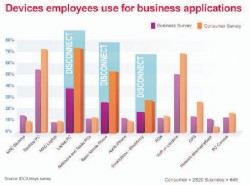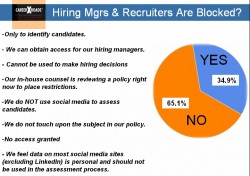 Do you use your personal phone to access the company ATS when you’re not in the office? Or maybe just to contact that hard-to-reach hot prospect? Of course you do.
Do you use your personal phone to access the company ATS when you’re not in the office? Or maybe just to contact that hard-to-reach hot prospect? Of course you do.
How about texting prospects from your personal phone? Or tweeting out a note to your talent community? Or downloading a spreadsheet or document to your flash drive so you can work on it over the weekend?
All of this is so routine you may be wondering why I’m even bringing it up. Well, it may be more routine than you suspect; 95 percent of information workers use at least one personally purchased device for work, according to a study by IDC/Unisys. The average number of consumer devices used for business by workers in a day? Four.
The big deal about this is that most companies haven’t caught up to what’s going on in the workplace. A 2009 study by Robert Half Technology found more than half of companies block access to one or more sites, including Twitter and Facebook. Only 19 percent allowed access for business purposes.
Remarkably, a CareerXroads survey about the same time found 35 percent of recruiters and hiring manager were blocked from social media sites.
 Ignoring the wisdom of blocking, what the IDC/Unisys survey shows is the disconnect between policy and reality. What does it matter if IT blocks access to any site if an employee can simply use their own tools to access a site? Workers report using laptops, smartphones, and the like twice as frequently as employers think.
Ignoring the wisdom of blocking, what the IDC/Unisys survey shows is the disconnect between policy and reality. What does it matter if IT blocks access to any site if an employee can simply use their own tools to access a site? Workers report using laptops, smartphones, and the like twice as frequently as employers think.
Unisys is a networking and IT infrastructure company, so its focus in commissioning the survey was to alert businesses to the ubiquity of personal devices in the workplace and the impact that has on security and IT support. It calls the growth in consumer devices in the workplace a “fourth wave of corporate productivity.”
However, the report should also serve as a wake-up call to HR — and that doesn’t mean adopting or broadening a policy to limit personal computing devices. As one part of the report notes, employees feel strongly enough about the quality of the technology and how it is supported, that it’s an important factor in taking a job.
Whether anyone but an IT prospect would turn down a job because of the tech tools is debatable, but when companies have policies that don’t mesh with reality, it’s a problem. Another example? Despite 78 million smartphones in use in the U.S., fewer than half of employers allow workers to use them to access business systems. Now wonder then that workers give employers below-average marks for support.
What’s the point here? If your company is one that limits access to some or all external sites or otherwise has a policy that is easily controverted by the use of personal devices, it’s time to fix it. As the CareerXroads survey found, only 20 percent of the policies were written by HR. But 100 percent of them will sooner or later involve HR.
Considering that you are among the information workers using your personal device — perhaps even in a way that, if it were company property, might be in violation of the policy — isn’t now a good time to propose updating that policy to conform it with reality?